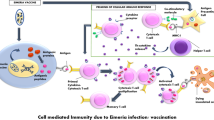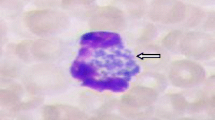Summary
Bovine tropical theileriosis caused byTheileria annulata is an economically important disease of cattle in India. The disease has assumed paramount importance with the intensification of cross-breeding programmes aimed at enhancing milk production in the country. To control this disease, a cell culture vaccine was developed in this department by continuous passaging ofT. annulata (Hisar) schizontsin vitro. Current work in this department has concentrated on the epidemiology of theileriosis; development of the cell culture vaccine for very young calves and pregnant cows; evaluation of serological responses using immunofluorescent antibody (IFA) tests and Enzyme-linked immunosorbent antibody assays (ELISA); studies on the duration of immunity stimulated by the cell culture vaccine; the immune/susceptible status of calves born to vaccinated dams. Results have shown the following. Clinical cases of theileriosis were mainly observed in young calves below two months of age followed by adults in exotic and cross-bred animals. Amongst indigenous animals, only young calves below two months of age suffered from clinical disease. Clinical cases of theileriosis mainly occurred between the months of April to October. TheT. annulata schizont cell culture vaccine developed in the department was extensively used in the susceptible calves and pregnant/lactating cows in the field. Sufficiently high antibody titres were detected by both schizont as well as piroplasm antigen using both ELISA and IFAT. The results indicated that the vaccine was safe, potent and effective for all breeds and age groups of cattle under field conditions. ELISA was standardised forT. annulata using three antigens,viz.: soluble piroplasm, soluble schizont and cellular schizont antigens. Comparison of results with IFAT showed that ELISA is more sensitive, objective, reliable and specific as well as less cumbersome than IFAT. Piroplasm, cellular schizont and soluble schizont antigens were found to be suitable for the detection of antitheilerial antibodies as per their order in ELISA. Studies on the duration of immunity stimulated by theT. annulata schizont cell culture vaccine indicated that immunity started waning after six months. Calves born of dams immunised againstT. annulata with the cell culture vaccine were found to be fully susceptible to theileriosis soon after birth. This indicated that there was no passive transfer of immunity from dams to their offspring through colostrum.
Similar content being viewed by others
References
Flach E. J. &Ouhelli H. (1992). The epidemiology of tropical theileriosis (Theileria annulata infection in cattle) in an endemic area of Morocco.Veterinary Parasitology 44, 51–65.
Sharma R. D. &Gautam O. P. (1977). Theileriosis in cattle.Indian Journal of Parasitology 1, 87–91.
Sharma R. D. &Nichani A. K. (1990). A cell culture vaccine against bovine tropical theileriosis even for young calves.Proceedings First Asian Congress of Veterinary Parasitology. Bihar Veterinary College, Patna. October 6–8, 1990.
Sharma R. D. & Nichani A. K. (1991). Cell culture technology for the development of a vaccine against theileriosis. In: Proceedings, National Symposium on Biotechnology in Plant and Animal Sciences. HAU Hisar (India), October 1–12, 1991.
Sharma R. D., Nichani A. K. & Nanda P. C. (1989). Epidemiological observations on blood protista diseases in cattle.Proceedings of 8th Annual Convention of Indian Society for Veterinary Medicine, Izatnagar, October 4–6, 1989.
Sharma R. D., Shukla P. C., Nichani A. K., Rakha N. K. & Sarup S. (1987). Immunisation trials against bovine tropical theileriosis with a cell culture vaccine. In: Proceedings:23rd World Veterinary Congress, Montreal, Canada, August 16–21, 1987.
Shukla P. C. &Sharma R. D. (1991). Immunization of bovine calves with cell culture vaccine againstTheileria annulata.Acta Veterinaria Brno,60, 79–86.
Author information
Authors and Affiliations
Rights and permissions
About this article
Cite this article
Beniwal, R.K., Nichani, A.K., Sharma, R.D. et al. Responses in animals vaccinated with theTheileria annulata (Hisar) cell culture vaccine. Trop Anim Health Prod 29 (Suppl 4), 109S–113S (1997). https://doi.org/10.1007/BF02632947
Issue Date:
DOI: https://doi.org/10.1007/BF02632947




